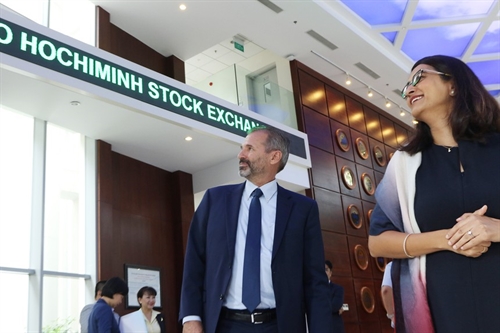Adopted in late 2019 with many new changes, the amended Law on Securities, available on Official Gazette issues Nos. 136-144 of 2019, is expected to make a positive impact on the Vietnam’s stock market.
 |
| The 2019 Securities Law is expected to make a positive impact on the Vietnam’s stock market__Photo: tinnhanhchungkhoan.vn |
The new Securities Law (the Law), which will come into force on January 1, 2021, consists of 10 chapters and 135 articles regulating securities and securities market activities, the rights and obligations of institutions and individuals operating in this field and the organization of the stock market.
As per the Law, there will be only one stock exchange operating all over the country. In other words, the Hanoi Stock Exchange (HNX) and the Ho Chi Minh City Stock Exchange (HSX) will be restructured and merged with one another to form a new stock exchange. However, this will not happen immediately but will be conducted when conditions permit. First of all, the Government will redefine the functions and tasks of HNX and HSX. Specifically, HNX will be specialized in bond and derivative securities transactions while HSX will deal with stock transactions.
 |
| Delegates of the National Assembly vote on the amended Securities Law at the eighth session of the 14th National Assembly on November 26, 2019__Photo: Internet |
The Law expands the definition of securities to cover also depositary receipts and non-voting depository receipts which have been prescribed the Enterprise Law but not yet mentioned in the 2006 Securities Law and its 2010 amendments. It also adds a definition of strategic investors related to private enterprises expanded the definition of professional investors and supplements the list of investors regarded as professional ones to include also individual investors with total value of securities portfolio of VND 2 billion or more or a taxable income of at least VND 1 billion in the least year.
The Law prescribes specific conditions and procedures for initial public offering (IPO) and secondary offering. It also imposes stricter conditions on public companies, requiring them to have a minimum charter capital of VND 30 billion, instead of VND 10 billion as currently prescribed, with at least 100 shareholders, excluding major shareholders holding at least 10 percent of shares.
Compared with the 2006 version, which was amended and supplemented in 2010, the new Law provides more prohibited acts in the securities sector to suit the actual practice, such as using one or more than one trading account or accounts of others to buy and purchase securities to create fake supply and demand, or using customers' accounts and assets without being entrusted or abusing trust to appropriate properties of customers, among others.- (VLLF)